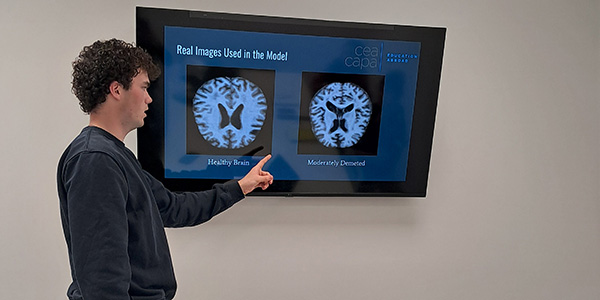Data Analytics student combines Alzheimer's research with Barcelona study abroad
Finnbar Cooney combined undergraduate research with cultural immersion during his semester abroad

Data Analytics student combines Alzheimer's research with Barcelona study abroad
Cooney spent last spring semester in Barcelona through the CEA CAPA Education Abroad program. For the next four months, he would attend classes, explore Spain and other European cities, and, of course, work on his research project with his Barcelona native mentor.
“There was so much to discover about the Spanish culture,” Cooney said. One of the experiences that stood out to him was the opportunity to watch Futbol Club Barcelona play a soccer match at the Barcelona Olympic Stadium. “The atmosphere of the game was unlike anything I had experienced before and being in such a historic place to watch one of the world’s most famous sports teams was a dream come true.”
Still, his time in Spain came with its fair share of challenges. Though Cooney had studied Spanish for six years, he admitted he was still nervous about the learning curve of being surrounded by the language: “The pace at which locals spoke was unlike anything I was ever used to. They also spoke a language called Catalan, which I was completely unfamiliar with. This led to a lot of misreading signs and confusing conversations.”
Once in Barcelona, Cooney was connected with Ignasi Montero Serra, a Senior Data Scientist for Bayer with a Ph.D. in Quantitative Ecology. Serra helped Cooney narrow down his research interests to a project on Alzheimer’s understanding and prevention, then guided him through the process of research.
“I wanted to tackle a real-world problem as well as something that has personally affected me,” Cooney said about finding his research topic. “Alzheimer’s is something that has run in my family and I know firsthand how detrimental it can be. By finding data-driven solutions, the disease could be slowed or even stopped, so I wanted to see what I could do.”
By using deep learning and machine learning models, and analyzing patient data, Cooney’s goal was to identify early warning signs of and key health correlations of Alzheimer’s, thereby improving detection, intervention, and patient outcomes. Cooney said he hopes his project will raise awareness about the disease and encourage individuals to take charge of their health.
“Early recognition of the disease can allow individuals to make lifestyle changes, explore emerging treatment options, and better plan for their future,” Cooney said.
Cooney used a data set of 40,000 MRI brain scans to train a predictive model to determine stages of Alzheimer’s disease, which were sorted into categories such as non-demented, very mildly demented, mildly demented, and moderately demented. Cooney then used Excel to analyze a data set of 8,000 anonymous patients (both with and without Alzheimer’s disease) to draw conclusions on key biomarkers for the disease like age, BMI, drinking, smoking, head injuries, family history or previous medical conditions.
Cooney presented his research to the board of directors of the CEA CAPA program at the end of the semester. His data analysis identified cholesterol markers - including triglycerides, LDL, and HDL levels - as having the strongest correlation with Alzheimer’s development, though the reason for this connection remains unknown.
While he picked up many hard skills related to his major, Cooney’s research project also taught him how to be resilient through failure; he ran into his fair share of challenges while creating his models and analyzing the resulting data, but keeping a can-do attitude and leaning on others for support helped him to keep going.
“Be willing to make mistakes. It’s okay to reach for the stars and get knocked down a little. That’s how you’re going to learn the most,” Cooney said, adding “It’s okay to ask questions. It’s okay not to know the answer. As long as you’re willing to put in the time and effort, and you have a good team around you, you’re going to get good work done. You’re going to do things that you would have never thought were even possible going into it.”
This resilience helped Cooney to enjoy his time abroad as well as he battled homesickness. Being flexible and adaptable helped him to make new friends and say yes to new experiences. By the time he returned to Miami’s campus in April, Cooney said he had grown immensely. He advised students to embrace being uncomfortable and know there are plenty of resources available to help them, especially if they choose to pursue an undergraduate research project like he did. Being able to talk about his project and how it helped him grow personally and academically has helped him immensely during interviews for internships and jobs.
“You’ll learn a lot, you’ll grow a lot, you’ll make mistakes, but it will be a great experience,” Cooney said about the overall study abroad experience.